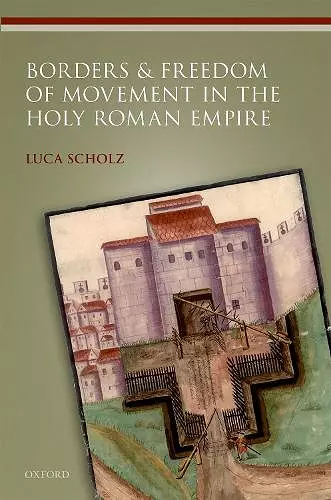Borders and Freedom of Movement in the Holy Roman Empire
Format:Hardback
Publisher:Oxford University Press
Published:6th Feb '20
Currently unavailable, and unfortunately no date known when it will be back

In the Holy Roman Empire 'no prince... can forbid men passage in the common road', wrote the English jurist John Selden. In practice, moving through one the most fractured landscapes in human history was rarely as straightforward as suggested by Selden's account of the German 'liberty of passage'. Across the Old Reich, mobile populations-from emperors to peasants-defied attempts to channel their mobility with actions ranging from mockery to bloodshed. In this study, Luca Scholz charts this contentious ordering of movement through the lens of safe conduct, an institution that was common throughout the early modern world but became a key framework for negotiating freedom of movement and its restriction in the Empire. Borders and Freedom of Movement in the Holy Roman Empire draws on sources discovered in twenty archives, from newly unearthed drawings to first-hand accounts by peasants, princes, and prisoners. Scholz's maps shift the focus from the border to the thoroughfare to show that controls of moving goods and people were rarely concentrated at borders before the mid-eighteenth century. Uncovering a forgotten chapter in the history of free movement, the author presents a new look at the unstable relationship of political authority and human mobility in the heartlands of old-regime Europe.
Rich in detail and analysis and innovative in its methodology and approach, Borders and Freedom of Movement in the Holy Roman Empire will undoubtedly provoke new research into many areas of historical research for years to come * Richard Calis, (Princeton), H-Soz-Kult *
"... impressive and important ... A particularly valuable aspect of Scholz's book is the way in which he examines the actions of rulers and governments alongside the role of low-level officials and local communities in policing or promoting that movement, while also making efforts to recover how ordinary people experienced the act of moving in this period * Rosa Salzberg, (Warwick), Annali.Reviews.Online *
... excellent ... at every stage, Scholz's analysis is embedded in the latest scholarship relating to frontiers in other European countries such as France and Spain. He also considers work on non-European frontiers of the same period in Asia, notably Japan. Above all his own re- search in over twenty German archives is impressively wide ranging and meticulous. * Joachim Whaley, (Cambridge), German History *
Excellent ... Borders and Freedom of Movement should be read by all scholars of the Holy Roman Empire and early modern Europe. * Christopher Close (Saint Joseph's), H-Net *
Sophisticated and nuanced ... Scholz's rich and illuminating case studies both underscore the value of anthropologically informed, historicizing approaches and offer powerful evidence in support of his deeper propositions—that early modern mobility and boundaries bore only a faint resemblance to the closable borders that have predominated since the eighteenth century * David M. Luebke (University of Oregon), German Studies Review *
Scholz has presented a fluently written and rigorously argued study that is based on intensive source work in twenty archives ... an innovative book that offers new thought-provoking impulses to many areas of research on the Holy Roman Empire * Tobias Schenk (Vienna), Zeitschrift für Historische Forschung *
Scholz's explanation provides a practical understanding of how people experienced borders and boundaries while on the road * Annemieke Romein (Amsterdam), The Seventeenth Century *
Admirable ... thanks to his solid theoretical background, Scholz shows that the real question at stake is not if borders mattered in the early modern world but rather when, how, why, and for whom they mattered. * Ian F. Hathaway, (Mainz), CROMOHS *
With Borders and Freedom of Movement in the Holy Roman Empire, Luca Scholz has provided a highly interesting, relevant, yet easily accessible study that makes a significant contribution to a better understanding of borders in the Empire. The book - and with it the theme of borders in the early modern period - deserves wide future reception. * Simon Franzen (Erfurt), Historische Zeitschrift *
It is an extremely successful work, which not only argues stringently, but is also written very vividly by concentrating on individual case studies. * Sehepunkte *
The historiographical art when dealing with the pre-modern Empire and its territories lies in alternating a territorial perspective with comprehensive, systematic understanding. Luca Scholz's book is a prime example. * Andreas Rutz (Dresden), Sehepunkte *
Luca Scholz's conclusions reach well beyond the borders of early modern Central Europe. His analysis of embodied and material movement as a critical venue for contestations and theatrics of power is original and important, and scholars studying mobility and state control in the modern period will find much to consider in the alternative landscapes Scholz's subjects inhabited and the meanings they ascribed to them. * Christine R. Johnson (St. Louis), Central European History *
ISBN: 9780198845676
Dimensions: 241mm x 163mm x 21mm
Weight: 624g
280 pages